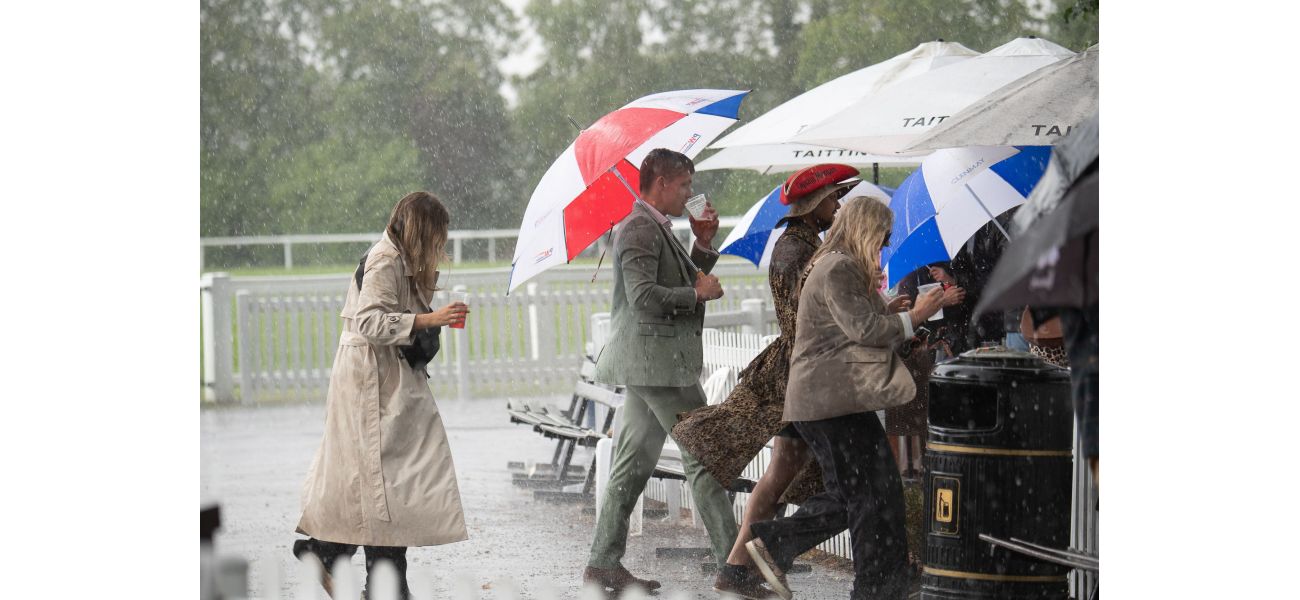The UK experienced its coolest summer in nearly a decade.
We're not talking about being cool enough to score Oasis tickets.
September 3rd 2024.

Despite the heavy rain, racegoers at Royal Windsor Racecourse were determined to make the most of the August event. Unfortunately, the results for the summer of 2024 were not as impressive as hoped. With drizzle at Wimbledon and Royal Windsor Racecourse, followed by thunderstorms and record-breaking rain at Glastonbury, it's no surprise that this summer was a bit of a letdown. According to the latest provisional figures from the Met Office, this has been the UK's coolest summer since 2015, nearly a decade ago. Scotland and Northern Ireland experienced cooler temperatures overall, with the mean temperature being 0.22°C below the long-term meteorological average.
Met Office scientist Emily Carlisle explained that June and July were both below average in terms of temperature, with August only slightly warmer. This was due to northerly winds bringing cold air from the Arctic, while August saw an increase in westerly winds bringing slightly warmer Atlantic air. While there were some heatwaves and hot spells, they were short-lived and the overall summer weather was quite unsettled.
The Met Office released a press release on September 2, 2024, announcing that the UK had its coolest summer since 2015. According to the statistics, August was the wettest month of the summer, with some areas in Scotland receiving twice the average summer rainfall. Storm Lilian also brought strong winds and heavy rain towards the end of the month. The average mean temperature for the UK was 14.37°C, which is 0.22°C cooler than the long-term average. The last time the temperature was this low was in 2015, when the average for the summer was 13.91°C.
While England was only slightly below average, Scotland and Northern Ireland were significantly cooler, with temperatures 0.40°C and 0.45°C below average, respectively. However, there were some hot spells, with temperatures reaching 30°C in West Sussex just yesterday. So, it wasn't all bad news.
In fact, Cambridge saw the highest temperature of the year on August 12, with a scorching 34.8°C recorded. But overall, there were few sustained hot spells. This summer was even blamed for a period of deflation in shops, particularly for clothing and electrical items. Surprisingly, despite the cooler temperatures, there was actually less rainfall than average. Overall, there was a 5% decrease in rainfall, although Scotland did experience particularly high levels of rain, while southern England had less than half of its monthly average.
It's important to note that even though this was the coolest summer since 2015, it was still warmer than the average summer compared to 1961-1990. To get a better understanding of recent years, the average temperatures are calculated in decades, rather than since records began. In the previous meteorological averaging period, the average mean temperature was 13.78°C, compared to this year's 14.37°C. This shows that even in a disappointing summer, the temperature is still warmer than it was 50 years ago, highlighting the impact of a warming climate.
Met Office scientist Emily Carlisle explained that June and July were both below average in terms of temperature, with August only slightly warmer. This was due to northerly winds bringing cold air from the Arctic, while August saw an increase in westerly winds bringing slightly warmer Atlantic air. While there were some heatwaves and hot spells, they were short-lived and the overall summer weather was quite unsettled.
The Met Office released a press release on September 2, 2024, announcing that the UK had its coolest summer since 2015. According to the statistics, August was the wettest month of the summer, with some areas in Scotland receiving twice the average summer rainfall. Storm Lilian also brought strong winds and heavy rain towards the end of the month. The average mean temperature for the UK was 14.37°C, which is 0.22°C cooler than the long-term average. The last time the temperature was this low was in 2015, when the average for the summer was 13.91°C.
While England was only slightly below average, Scotland and Northern Ireland were significantly cooler, with temperatures 0.40°C and 0.45°C below average, respectively. However, there were some hot spells, with temperatures reaching 30°C in West Sussex just yesterday. So, it wasn't all bad news.
In fact, Cambridge saw the highest temperature of the year on August 12, with a scorching 34.8°C recorded. But overall, there were few sustained hot spells. This summer was even blamed for a period of deflation in shops, particularly for clothing and electrical items. Surprisingly, despite the cooler temperatures, there was actually less rainfall than average. Overall, there was a 5% decrease in rainfall, although Scotland did experience particularly high levels of rain, while southern England had less than half of its monthly average.
It's important to note that even though this was the coolest summer since 2015, it was still warmer than the average summer compared to 1961-1990. To get a better understanding of recent years, the average temperatures are calculated in decades, rather than since records began. In the previous meteorological averaging period, the average mean temperature was 13.78°C, compared to this year's 14.37°C. This shows that even in a disappointing summer, the temperature is still warmer than it was 50 years ago, highlighting the impact of a warming climate.
[This article has been trending online recently and has been generated with AI. Your feed is customized.]
[Generative AI is experimental.]
0
0
Submit Comment





